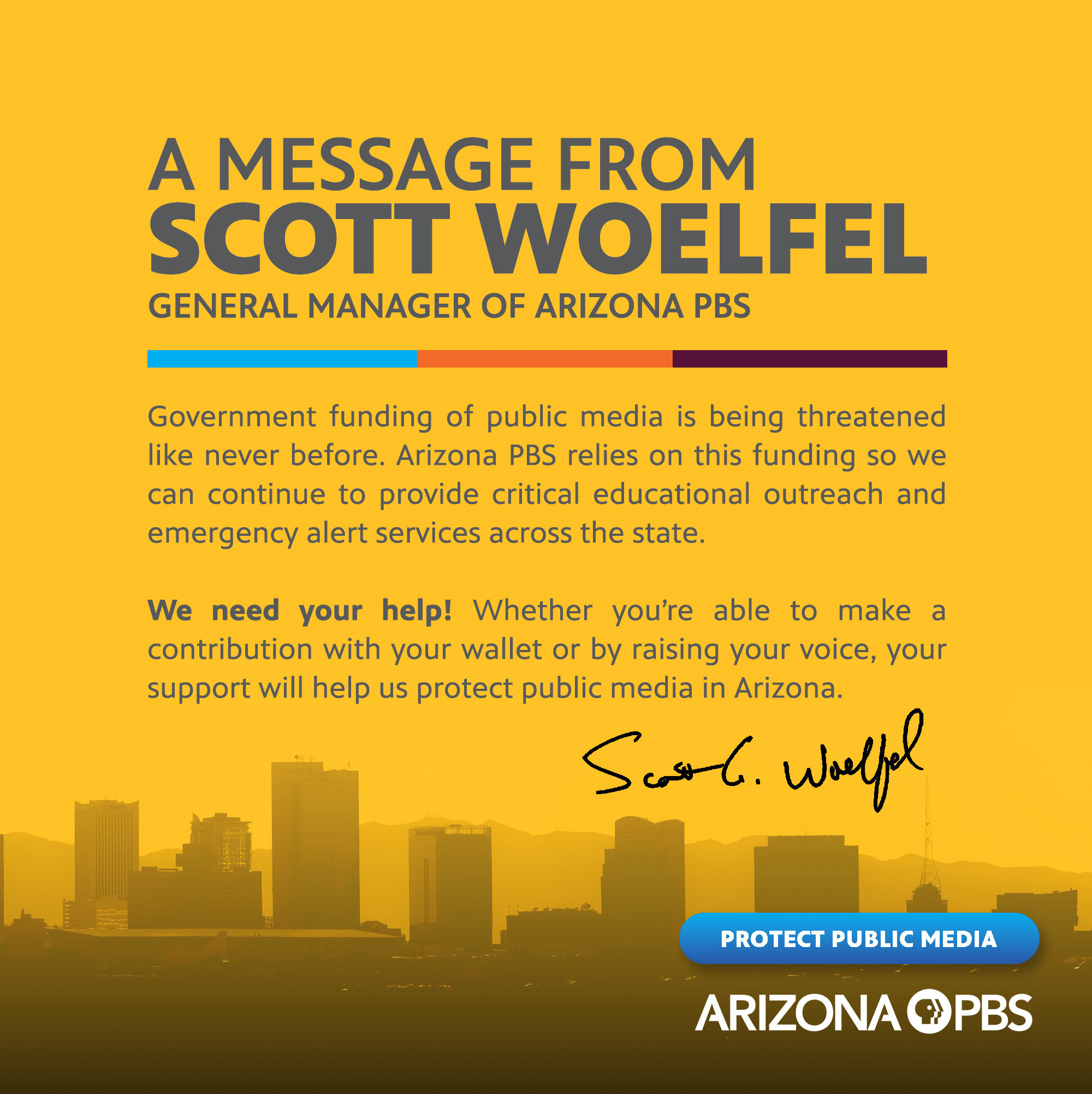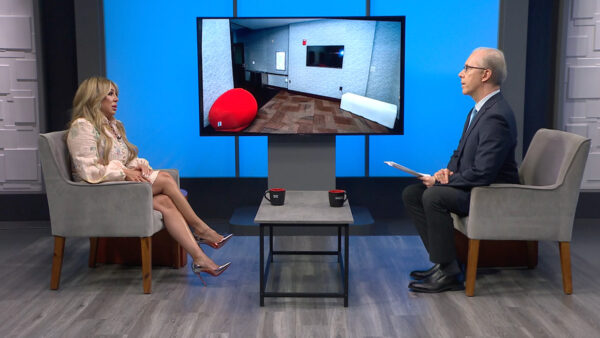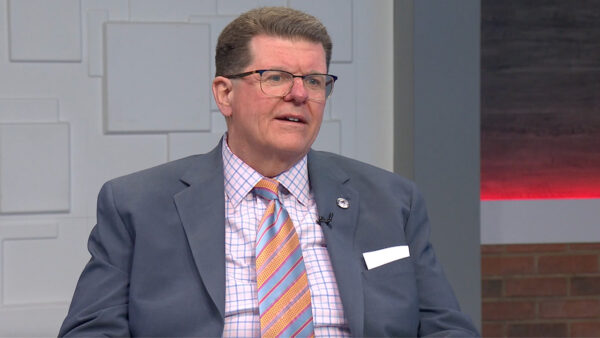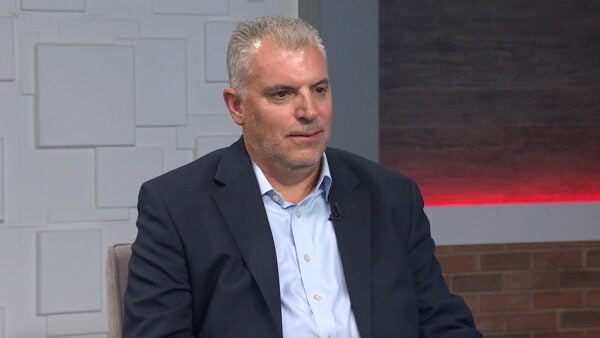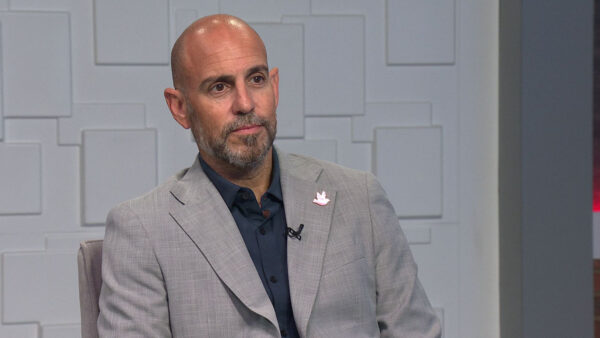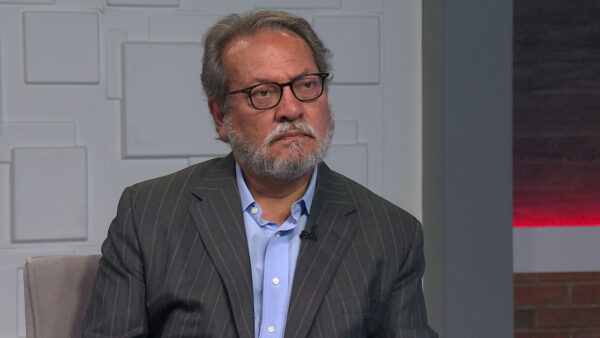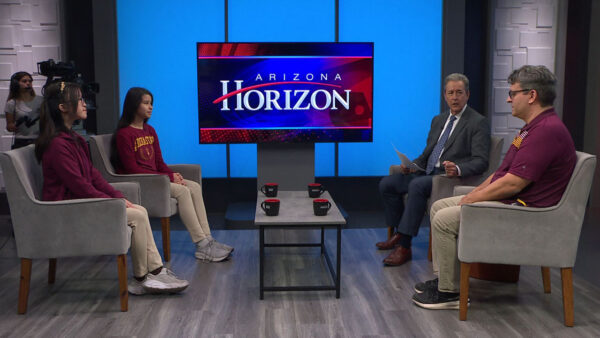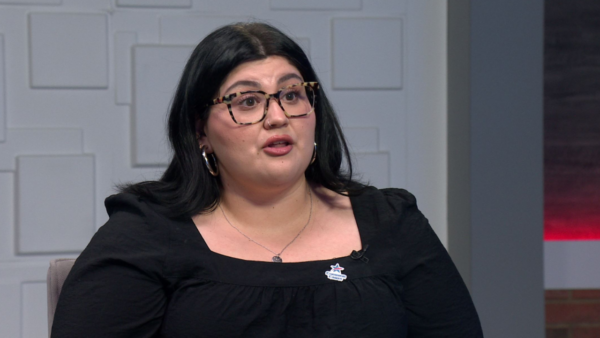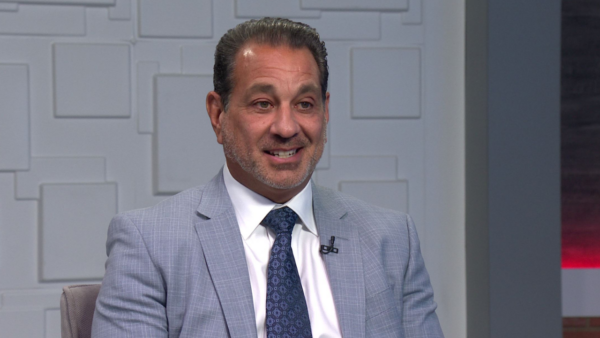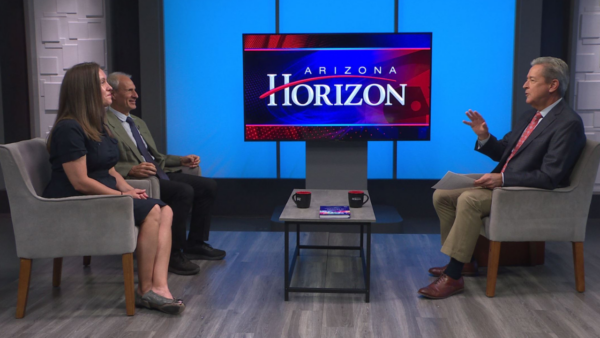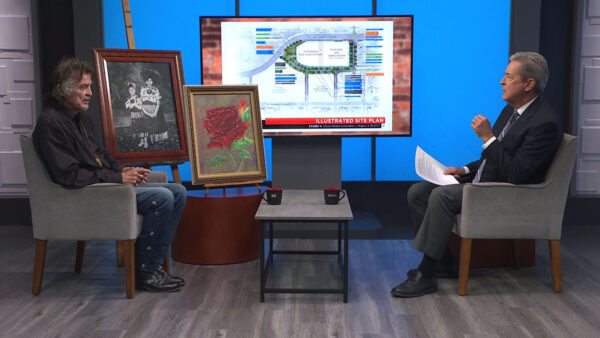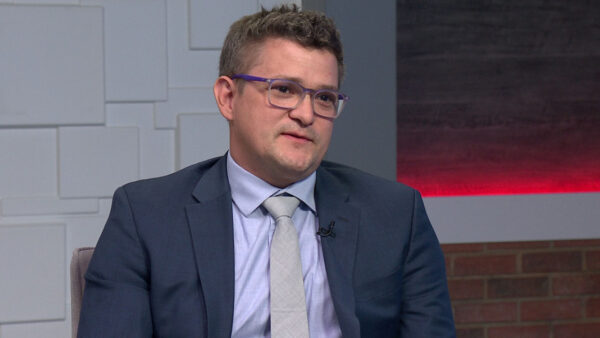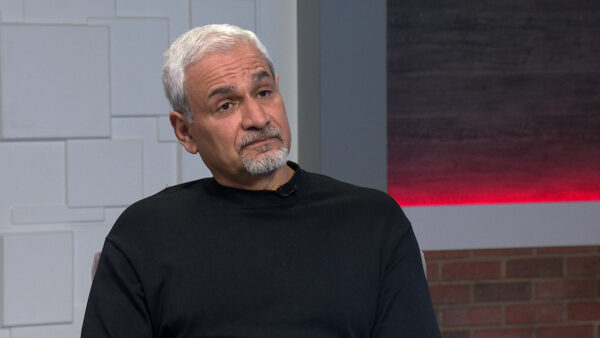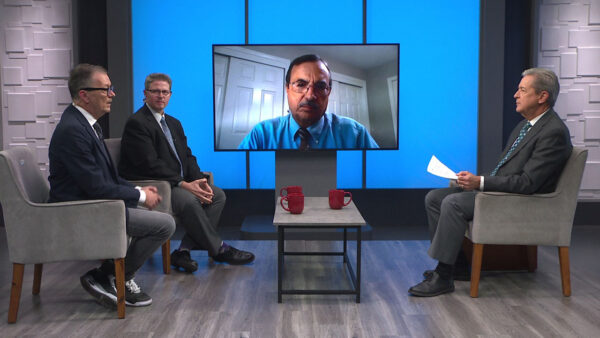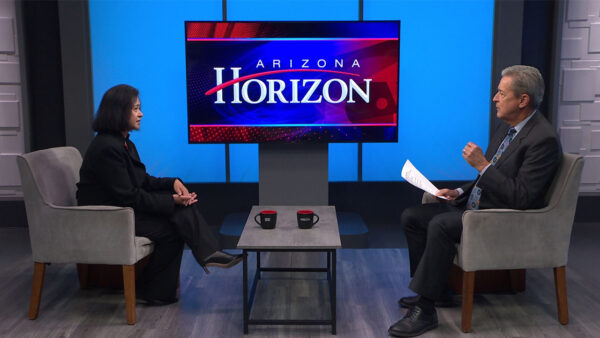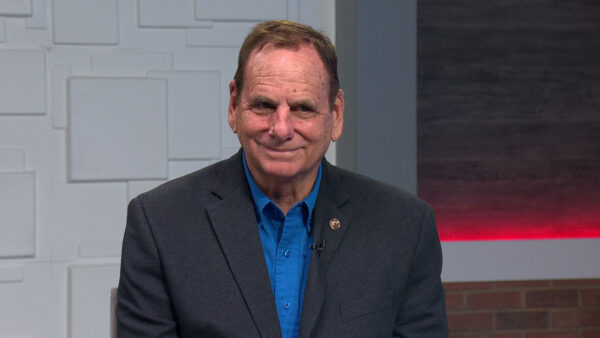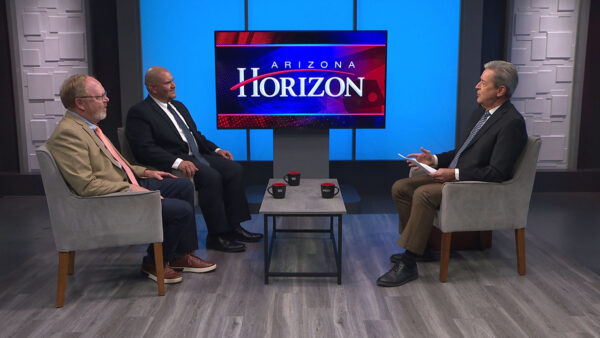June 30, 2016 marks the third year since the Yarnell Hill Fire tragedy, which claimed the lives of 19 members of the Granite Mountain Hotshot crew. We’ll hear from two authors of books about that horrible day. New York Times Phoenix bureau chief Fernanda Santos will discuss her book, “The Fire Line,” while the lone survivor of the Granite Mountain Hotshot crew, Brendan McDonough, will talk about his book “My Lost Brothers.”
Ted Simons: Coming up next on a special edition of "Arizona Horizon," three years ago today, the Yarnell Hill fire claimed the lives of 19 Granite Mountain hotshot firefighters. We'll hear from the author of a new book that chronicles those impacted bite 14. And we'll speak with the lone hotshot survivor of that deadly blaze. That's next on this special edition of "Arizona Horizon."
Video: "Arizona Horizon" is made possible by contributions from the friends of Arizona PBS. Members of your PBS station. Thank you.
Ted Simons: Good evening, and welcome to "Arizona Horizon." I'm Ted Simons.
Ted Simons: Three years ago today, 19 Arizona firefighters died in the Yarnell Hill fire, one of the worst wildfire disasters in U.S. history. A new book titled "The Fire Line" focuses on those who lost their lived had lived their lives and what happened on that late afternoon in June of 2013. The author is "New York Times" Phoenix bureau chief Fernanda Santos. Good to have you here.
Fernanda Santos: It's great to be here.
Ted Simons: This book is compelling from the word "go." Let's talk about this. Who were the Granite Mountain hotshots?
Fernanda Santos: They were kids, by and large. Most of them were in their 20s, 14 of the 19 were still in their 20s. Three of them had pregnant women at home, they loved to hike, kayak, jog, do things outdoors. And most of all, they loved the job they did. They were one of those guys who loved to work together. And had a great time fighting firefighters in the wild.
Ted Simons: Why -- we're seeing them now. Why were they doing this line of work? Was it a sense of adventure, camaraderie?
Fernanda Santos: I think a little bit of both. There was a sense of Van Buren for a lot of them as an opportunity to see different parts of the country. This was a crew as all hotshot crews do, that traveled all across the United States, mostly in the west. And many of them used to say they got paid to see places that most of us never get to see. Sleep out under the stars. They enjoyed that.
Ted Simons: For some of these guys, the discipline was a big factor, wasn't it?
Fernanda Santos: M-hmm. Yes. Of course it's a job that has a lot of fun times, but also when it comes time to go and fight fire, you have to work together. You have to follow rules, you have to perform your role so that other people can do their job well. So there were men on the crew to whom the job provided a chance at redemption, salvation, almost.
Ted Simons: And as far as some were full-time, some part-time, some -- how did that work? Contract work?
Fernanda Santos: Well, in general, when it comes to hotshot crews, they work based on a fire season that starts roughly around mid April and goes around -- through mid October. And so the ones full-time were six on Granite Mountain, the remaining were hired for that fire season. Of course because it was a city fire department, some of them stayed on on a separate contract to work during the winter.
Ted Simons: We'll get to that in a minute, because after that was over with, that was a very important part of benefits and the postmortem if you will. Describe the Yarnell Hill fire area.
Fernanda Santos: That area had not burned in more than 40 years. It was full of brush, very, very dry. The last measurable rain they'd had in Yarnell was April, and this fire was June 30th. So they had several months with not a drop of rain fell from the sky. It was overgrown, there was also a lot of brush in the town. It's sort of one of those tiny Arizona towns in the middle of nowhere, and a lot of people liked to have the brush around them. It was sort of a curtain of privacy that they had. A natural curtain of privacy, which in the end caused a lot of homes in town to burn.
Ted Simons: How did this fire start and how fast did it grow?
Fernanda Santos: This fire started like a lot of fires start in Arizona in June during the monsoon season, from a lightning strike. This time of year is still very hot and dry, so even though there's rain that is falling in the sky, the rain evaporates before it hits the ground. But the lightning of course makes contact, and it was like a match dropped in kindling. It started at the top of a mountain, and it seemed at first to be a relatively small fire, but of course got out of control and we ended up with what we did.
Ted Simons: And in the book you write the way it was -- initial reports were it wasn't much of a fire, but it was persistent.
Fernanda Santos: Exactly. And that's the tricky thing about fire. One of those enemies that is cunning, it's always trying to outsmart you in some way. It's almost -- it's a living thing. And it's the only of the natural elements that we fight. We don't fight hurricanes or tsunamis, we run from them. But we still fight fire.
Ted Simons: It was interesting that dichotomy of natural disasters, you experience, you survive, you fight fires. Do you your best to fight those. With that in mind, it sounds as though it was first fought by prison crews. That was the first line of defense.
Fernanda Santos: And it's a very common thing in the west. In fact, California has a huge inmate program; Arizona has several prisons that have fire crews. And the crew from the Lewis prison in buckeye was the first ones to show up, and about six men eventually made their way up to the mountain by helicopter and tried to put out this fire, but again, with the weather, they just couldn't keep it under control.
Ted Simons: It sounds like some folks misjudged this fire early on. Judging from your book, it sounds like some folks misjudged this.
Fernanda Santos: You know, it's one of those things I think in hindsight we can see how it was miscalculated, there were decisions that maybe should have been made differently. But it's very hard when you're in somebody's shoes and something is moving so quickly, and evolving, and changing. To say whether or not they made a good or bad call. Yes, it was a fire I would say surprised a lot of people.
Ted Simons: On June 30th, close there, a two-acre fire in the morning got to be 100 acres by 7:30, the night before. Here come the hotshot. Had they -- was it 12 straight days they had worked with no break before they got to Yarnell Hill?
Fernanda Santos: That's how they do their job. They work 14 days, 16-hour days, and then they have two mandatory days off. That was -- the last day they were allowed to work. Given they are so close to Prescott, their home base, they probably thought, you know, let's go out there, this is not a huge deal, not a big fire, it's on our back yard, we'll put it out, we'll come back home and sleep with our wives and our children at night.
Ted Simons: So here come the hotshots. I want to talk about a couple in particular. Eric marsh, we have a photo of Eric marsh and Amanda marsh together. Who was Eric marsh?
Fernanda Santos: He was the superintendent of this crew, the leader of this crew. He was the man who set the rules and created a character for this crew. A crew of second chancers, as I call it in the book. He was a recovering alcoholic. He was a remarkable man who basically rebuilt his life and was able to guide a lot of men who were struggling into becoming not only good firefighters with good men, he helped kids, Brendan McDonough the survivor, was one of those he helped, john PERCIN was also somebody he helped. People who had problems. But he said I went through it, I got over it, you can do it too.
Ted Simons: All right. Who is -- who was, unfortunately, Jesse steed.
Fernanda Santos: He was the captain, the second in command. I call him the beardless Paul Bunyan, he was this big, handsome man, who won time pushed a tree that was falling his way the opposite direction. He was a father of two young children, a husband, a guy who loved to hug the hotshots and say "I love you, brother." He was the YIN-YANG.
Ted Simons: So with these two in control, they're there, you write at 3:26 in the afternoon, weather report, there's a storm closing in from the north, they're already -- there already was a storm in the south. Did the storms combine, did they circle? What happened?
Fernanda Santos: The fire was moving north, and there was this storm coming from the north. So they were -- they collided. And what the storm did, the winds did, was literally turn the flames -- the flames did a 180-degree turn, some people described -- they drew a horseshoe in the air. And they came back the opposite direction towards the crew, which was to the south of the fire.
Ted Simons: And the crew was -- eventually working this, I guess it sounds like they went to a blacked out area, an area that had previously burned. Smart thing to do, correct?
Fernanda Santos: Yes. It's generally the safest place in a wildfire.
Ted Simons: We're talking down drafts, you write 40 to 50 mile-an-hour down drafts with this storm, a rapidly shifting wind, the fire gains strength with every shift. They're up in this blackened area. They didn't stay in the blackened area. Why?
Fernanda Santos: You know, I think they are the only ones who know the answer. What I can say is that wildland firefighters don't make decisions that are predicated on the possibility of death. So my conclusion in knowing these guys, through their families and writing this book was that whatever thought process they went through, was one that justified them leaving the safety of the black, going down this canyon.
Ted Simons: And we're seeing them there. They're safe here.
Fernanda Santos: You can see the fire, they have a ranch ahead of them, we can't see the ranch here, but there's a ranch there that survived the fire. And so the thought is that they -- the thinking is they went down this canyon and were going towards the ranch, presumably to help in the town of Yarnell. There were calculations that the fire was about an hour away. Of course all of those calculations proved to be wrong.
Ted Simons: And I think we have another photograph here of one of the hotshots. Basically just not long before they got into --
Fernanda Santos: Literally moments, yes. This is Andrew ashcraft.
Ted Simons: And moments later, they're trapped by this thing. Everyone wants to find out what happened and they want to know how to keep something from -- like that from happening again. So what do we learn from this? What can we change?
Fernanda Santos: There was not one single thing that went wrong and caused these men to die. There were several things along the way. There were problems with communication, there were problems with an overreliance on people who had been working together for a long time, knew fire very well, that -- that they would do the job well without the very final, the trust -- they have a similar system in fire, in this case they just let people make their decisions thinking they're making the right call, but if you're making the right call and I am, but I don't know the decision you're making, maybe our decisions are not mask. And that's sort of had happened. One can look back at the decision the crew made to go down the mountain and say it was horribly wrong, but again, these guys had reason to go back home. They were not on a suicide mission. So it's a horrible tragedy that happened, but whatever decision they made, I'm convinced that it was something they thought was the right thing to do.
Ted Simons: Did we know whether or not marsh gave the order to go back there?
Fernanda Santos: Well, the thing is that there was some discussion about this order that may or may not have been given. But ultimately the crew had to have agreed, either because the leadership agreed and the others followed, most likely that's how it goes, or because everybody thought there was the way to go. But really to me what was the most important part of this story wasn't so much who is to blame, but it was the final moment of these men, they were found in a space of about 20 feet by 30 feet, these are big guys, ambitious guys, strong, well-trained. Why didn't they run? That to me was the question I wanted to answer. And I felt that to answer this question, I had to get to know all of them. And I think that is a much more interesting and universal story. When you talk about the human aspect of fire, both from the endearing side of things and the critical and problematic side of things. And I it this book has both.
Ted Simons: Did working on this book change you?
Fernanda Santos: It changed me profoundly. I got to believe that there's no such thing as an individual victory. Everything we do, we do together. Have you your camera people here, I have editors in my newspaper, yeah, it completely changed me.
Ted Simons: I can tell, because it sounds like you got very involved in the families, very involved in these lives, and very involved in the telling of the story. Congratulations on this book. Great job.
Fernanda Santos: Thank you.
Ted Simons: Thank you so much for joining us.
Fernanda Santos: Thank you for having me.
Ted Simons: Next we hear from the author of a book written by the lone Granite Mountain hotshot survivor of the Yarnell Hill fire. Brendan McDonough's memoir is "My Lost Brothers: The Untold Story by The Yarnell Hill Fire's Lone Survivor." The book recounts his life and his relationships with his 19 team members who died in the tragedy. Good to see you here. Thanks for joining us.
Brendan McDonough: Thank you for having me.
Ted Simons: I like to ask how people are doing, but with you, I'm especially interested. How are you doing?
Brendan McDonough: I'm doing well. For everything I've been through, I've had a lot of great support and a lot of breakthrough recently in just feel good. Feel healthy and feel in a really good place.
Ted Simons: The breakthrough by way of what? Counseling?
Brendan McDonough: I think it was combination of a lot of things. Strengthening my faith, counseling, community service, and just good work with great people.
Ted Simons: How did you become a hotshot?
Brendan McDonough: Back in 2011, I had walked into an office and asked if there they were hiring, and literally five people had just quit within that first week. And so I had an interview on the spot. It was very fast paced, a little shocked and surprised, but very happy that I had the chance to do that.
Ted Simons: But before that, though, you had a troubled interesting, varied but troubled life. Talk to us about that.
Brendan McDonough: Yes. So six months getting hired, prior to getting hired, I was in jail for, you know, arrested for a crime. And right after jail I enrolled in my EMT class to try and get on an ambulance, just to try and do anything to better my life. And it was really tough, it was just a battle of drug addiction, and feeling like a failure, as a father, as someone who want to serve the community but couldn't because of the mistakes I made. So that was the battle I had before I got hired on.
Ted Simons: It sounds like you wanted a change for your daughter.
Brendan McDonough: Yes. Very much so. I wanted to be a father for her and be the father that I didn't have growing up.
Ted Simons: You could have done many things. You could have gone in many different directions to try and set yourself straight and prove yourself to your daughter. You chose being a hotshot. Why again that profession?
Brendan McDonough: It was something that I always wanted to be a part of, and it was something that I knew I needed to do for other opportunities to open up within fighting fires.
Ted Simons: Were you aware of the discipline involved?
Brendan McDonough: I think you can only understand so much before you go into a job like that. And I tried to be as aware as possible, but when I got there, it was a lot of things that were new and a lot of things I didn't understand and a lot of things the guys, you know, taught me.
Ted Simons: Before they taught you, when you first got there, did you face skepticism? Here's a guy with a troubled past, were people look at you sideways a little bit?
Brendan McDonough: Oh, yeah. I came in later than any of the other rookies, and I wasn't in -- even close to the shape they were in, so a lot of that was very tough to beat. But as soon as I did, I knew when I was accepted I knew I had great brothers that would stand behind me.
Ted Simons: Eric Marsh, the team leader there, talk to us about his impact on you. It sounds like he took a chance on you.
Brendan McDonough: Yeah, definitely took a chance to me, a second-chance kid, I would say. One of the things Eric taught me besides being firefighter is how to be a responsible person and be a responsible adult. And how to be a father. And those were characteristics I learned from all my brothers, even though some of them weren't fathers, they still had characteristics that were very similar to what I needed to be and what I needed to learn.
Ted Simons: So when did you know you could do this? You could --
Brendan McDonough: I never doubted myself. I think that's why I was able to do it.
Ted Simons: Interesting.
Brendan McDonough: There's a few moments, I guess I could never say never, but once I had gotten through my first few months of fighting wildfires, I knew this was my passion, this is the job I wanted. And these are the men I wanted to be around. These were the type of people I wanted in my life that were continuing to help build me up.
Ted Simons: You referred to this earlier, when did you know you had the confidence of your team members? Was there a point in time, okay, I --
Brendan McDonough: Yeah. I think it was after my second fire when we were gone for 14 days, and it was just back breaking work, a lot of cutting lines, a lot of burning, and just a lot of doing what hotshots do. Just living up to that title. And once they -- I believe they saw, hey, he's not going to quit, he's not going to give in, he can -- he's tough, he wants to work, he wants to be a part of this, he wants to be dedicated, I feel like that's when I really gained their trust and understood what the brotherhood was.
Ted Simons: All right. What happened on June 30th, 2013?
Brendan McDonough: You know, for me, June 30th is a pretty difficult day to remember. A lot of trauma there. So getting to Yarnell, we were assigned to a division, and get in there and try to get an anchor in. That's what we tried to accomplish. It was just a very difficult day with the amount of resources we had, and with the amount of fire that was there. It was a pretty small fire in the sense of things such as Fort Mcmurray that's almost a million acres. As the day went on, we just were trying to delegate jobs, and I got chose to be the lookout, and with different weather events and different communications, and things like that, we've had -- we have the tragedy. We have 19 men dying.
Brendan McDonough: Back to the day, as far as being the lookout, what could you see? Could you see the others from where you were? What -- your vantage point. You're the lookout, what were you looking out at?
Brendan McDonough: So what I'm trying to look out for is I'm trying to see what's going on with the fire, I'm trying to have good eyes on it, I'm taking weather for them, to see if there's any change in the relative humidity, the wind. Things like that. And I could see them, I could make out figures, I couldn't see faces, but I knew that was my crew, I knew someone was running a chain saw, and I could hear the chain saws running and things like that.
Ted Simons: Could you communicate with them?
Brendan McDonough: Yes, of course. I had a radio, so I could communicate with them. Clear line of sight for them to me, and clear line of sight from me to them.
Ted Simons: And they could communicate with you.
Brendan McDonough: Correct.
Ted Simons: And could you hear other communications they were receiving and sending as well?
Brendan McDonough: Some of them.
Ted Simons: But not all of them.
Brendan McDonough: Correct. You can't expect someone to be able to pick up every single communication on 10 different channels.
Ted Simons: Right.
Brendan McDonough: Your main priority is to your crew to really go above and beyond that is your superintendent and captain, and your squad bosses. One of the channels I was listening to was the weather channel. That was something I was trying to scan.
Ted Simons: So when did you know things had gone horribly wrong?
Brendan McDonough: I knew -- so that's a tricky question. I knew things were going horribly wrong when I started seeing homes get burned. That's horribly wrong. That's not something you like to see. When did I know my brothers were in horrible danger? When I heard it over the radio. That's when I truly understood how close they were, the position they were in, asking for water drops, things of that sort, trying to get those communications with the proper people, and that's when I started to feel the anxiety about, this could end bad.
Ted Simons: Yeah. I asked this question so different ways to different people -- why did they leave a relatively safe black area and go back into that canyon?
Brendan McDonough: Based on decisions and based on communications and based on information they had and were given. So as hotshots superintendents they make decisions based on information they're given, information they're seeing, what they're seeing, what they're hearing, and what they're getting. So that's -- that was the decision why they left the black. What those communications were, I wish could I answer. I really can't as of this moment.
Ted Simons: Yeah. And I ask you that because there have been critics who say that maybe you know a little bit more, but your loyalty, especially to Eric marsh, keeps you from maybe saying everything you know.
Brendan McDonough: No.
Ted Simons: Is that -- you don't agree with that?
Brendan McDonough: No, I do not agree with that. I've been completely up front and honest, and I think what we're coming to find is there's a few people that are investigating Yarnell Hill fire tragedy, and they are finding a lot of new findings on what happened that day, and it's not because it was a lack of discipline from the investigation, it wasn't a lack of training, it was just a lack of time. A lack of time and resources for them to truly get into this investigation. So I think there's a lot of things that we're going to come to learn and we're going to continue to grow as a community in the wildfire community, and we're going to continue to grow whole, and to learn from the decisions made that day. Not only from Eric marsh, but a lot of other people, include myself.
Ted Simons: One last thing about this, there's some suggesting maybe you did hear that order, you know who ordered them or you had a better idea of why they left the black. Again, these are people trying to find out what happened.
Brendan McDonough: Yeah.
Ted Simons: Is that a valid observation?
Brendan McDonough: No. I do not know who ordered them to leave the black. I do not know who asked them that, but I know that there are people looking into that. And they found radio transmissions that they're trying to match voices to, and trying to figure out, you know, what's being said and who's it being said to. So it's a long process. You look at a lot of wildfire tragedies and it takes us years to grow from. And it's not that we're stubborn or ignorant, there's just a lot of information there, and there's a lot of possibilities when you're fighting a natural disaster. You look at tornadoes, you look at tsunamis, do you send in crews there when -- in the heat of the moment? Do you send in people in there to go fight these natural disasters? So we're fighting a very diverse problem, so when something like this happens, it's very easy for people to point the finger and I'm just glad we have such great men and women in this community and are willing to take the time to dedicate to truly finding out what happened so we can prevent this.
Ted Simons: I was going to say, you understand why people ask the questions.
Brendan McDonough: Of course, oh, yes.
Ted Simons: It still seems vague. And when something as tragic as this happens, people want answer and they want to know what to fix. Have we learned lessons from this?
Brendan McDonough: I think we have a few lessons we've learned. I've seen the different tactics that people are using to fight fires, they're being a little more cautious with their decision making. Maybe they're thinking twice about doing something, and they're looking at new shelter designs, and by learning those lessons, that's what continuing to investigate into this fire is about. Those continue to grow.
Ted Simons: Didn't you write that nothing has really changed?
Brendan McDonough: Nothing has changed resources wise. As a whole, we need to stand behind these men and women, because they're getting spread so thin. There's no denying wildland firefighters are getting spread thin. And we need more resources, we need more HELItankers. They're trying to keep up with this pace of the wildfire seasons we're seeing. They're becoming year-round now. They're becoming more often, they're becoming larger, they're becoming more destructive. So with that, we're trying to keep up.
Ted Simons: Your reaction, the hours, the days, the weeks afterward. It sounds like -- I think everyone can understand, rough time for you.
Brendan McDonough: M-hmm.
Ted Simons: Talk to us about it.
Brendan McDonough: It was a very rough time. It's not that often that you bury 19 men in a very short amount of time. It's not often that you go to 14 funerals and you try to be strong and try and represent them in a whole. At that age, I didn't understand what those feelings were. I didn't know about trauma. I didn't know about grief. I didn't know about PTSD, I didn't know about those things. So it was all very new for me. And leading up to the time that I realized what I was going through, it just continued to compound and get worse. I mean, it was a good year before I even received counseling before I started going to counseling. So during that year, there was just all trauma and anxiety and depression, and not knowing how to deal with it. What's wrong with me, those feelings of self-doubt and guilt.
Ted Simons: It sounded like you came very close to committing suicide.
Brendan McDonough: M-hmm.
Ted Simons: What got you through? What got you through, past that incident into therapy? What was the breakthrough?
Brendan McDonough: I think just knowing my purpose, and knowing my purpose here is to be a father. And that was what I needed to remind myself of. And to be a good steward of my family, and to be a good person in my community, and there were people that looked to me for answers, like you're asking, and sometimes I hope I can be there to answer them. And the ones I can't answer, I'm willing to admit, I don't know. And just finding that purpose again. That's what really got me through that. Having such great support from my community, and my counselor, and having my faith has been tremendous.
Ted Simons: You got a long life ahead of you.
Brendan McDonough: Thank you.
Ted Simons: Good luck to you. And thank you so much for joining us.
Brendan McDonough: Thank you for having me. I really appreciate it.
Ted Simons: And that is it for now. I'm Ted Simons. Thank you so much for joining us on this special edition of "Arizona Horizon." You have a great evening. Captioning Performed By LNS Captioning www.LNScaptioning.com
Ted Simons: If you have comments about "Arizona Horizon," please contact us at one of the addresses on your screen. Your comments may be used on a future edition of "Arizona Horizon." Thank you.
Video: "Arizona Horizon" is made possible by contributions from the friends of eight. Members of your Arizona PBS station. Thank you.
Brendan McDonough: The Lone Survivor of the Granite Mountain Hotshot crew, Fernanda Santos: New York Times Phoenix bureau chief
